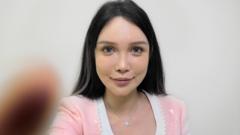Abby Wu, a pioneer among China's cosmetic surgery influencers, has undergone over 100 operations since her teenage years, overseeing her transformation into a beauty icon amidst a booming yet perilous industry. With rising popularity comes a dark side of unlicensed clinics, botched procedures, and beauty standards that continuously evolve, challenging the promising allure of aesthetic enhancement.
The Unstoppable Surge: Inside China's Cosmetic Surgery Phenomenon

The Unstoppable Surge: Inside China's Cosmetic Surgery Phenomenon
As the demand for cosmetic procedures rises, a deep dive into the transformative journey of Abby Wu and the implications of a booming beauty industry in China reveals both triumphs and tragedies.
Abby Wu’s journey into cosmetic surgery began at the tender age of 14 when she faced sudden weight gain due to a hormonal illness. This marked the start of her extensive transformation journey, fueled partially by societal pressures, as her drama teacher's comments lingered in her mind. Accompanied by her mother, Abby underwent liposuction, a traumatic experience that set a precedent for the 100+ procedures she would later undergo.
Now 35, Wu has carved out a niche for herself as one of China's foremost cosmetic surgery influencers, having co-founded a beauty clinic in Beijing and documented her trials and triumphs across social media. Despite the considerable physical toll that includes ongoing treatments for bruises and the aftermath of jaw surgeries, Abby insists she embraces her new self wholeheartedly: "I think my mum made the right call."
The surge in cosmetic surgery in China reflects broader societal changes, with 20 million citizens opting for procedures every year, predominantly young women aged around 25. As beauty ideals evolve, the range of surgeries has branched into increasingly bizarre procedures aiming to manifest hyper-feminine, almost child-like features.
Amid this explosion of surgical popularity, apps like SoYoung suggest enhancements based on users' facial scans, preying on insecurities by identifying "imperfections." Disturbingly, the pursuit of beauty has outstripped the integrity of many clinics; iResearch reports 80,000 unlicensed cosmetic facilities operating in China, resulting in numerous botched surgeries.
Dr. Yang Lu, a licensed plastic surgeon, has witnessed the harrowing fallout from unqualified practices. Yuemei's case exemplifies this plight; suffering from unsatisfactory collagen injections that hardened under her skin, her search for corrective surgery ended up causing further damage, a fate endured by many who engage with rogue clinics.
High-profile disasters like actress Gao Liu's botched nose operation have drawn public attention to the dire need for regulatory reform. Although initiatives to tighten regulations have been initiated, the black-market practice remains rampant, as clinics seamlessly shift identities to bypass scrutiny.
Perceived beauty contexts extend into job sectors, where assessments based on physical appearance have crept into recruitment norms. Women like Da Lan, lured by faux job opportunities in beauty clinics, often end up facing coercion for surgeries under false pretenses, leading to debt and disillusionment.
Despite the growing concerns, Abby Wu sees no end to her pursuit of self-improvement. Surrounded by friends discussing further enhancements, Abby delights in the camaraderie while acknowledging the deep effects her choices have made on her life. "I don't think I'll ever stop my journey of becoming more beautiful," she asserts, reflecting a dedicated devotion to an ever-evolving beauty landscape in China, one that intertwines aspiration with dire consequences.






















